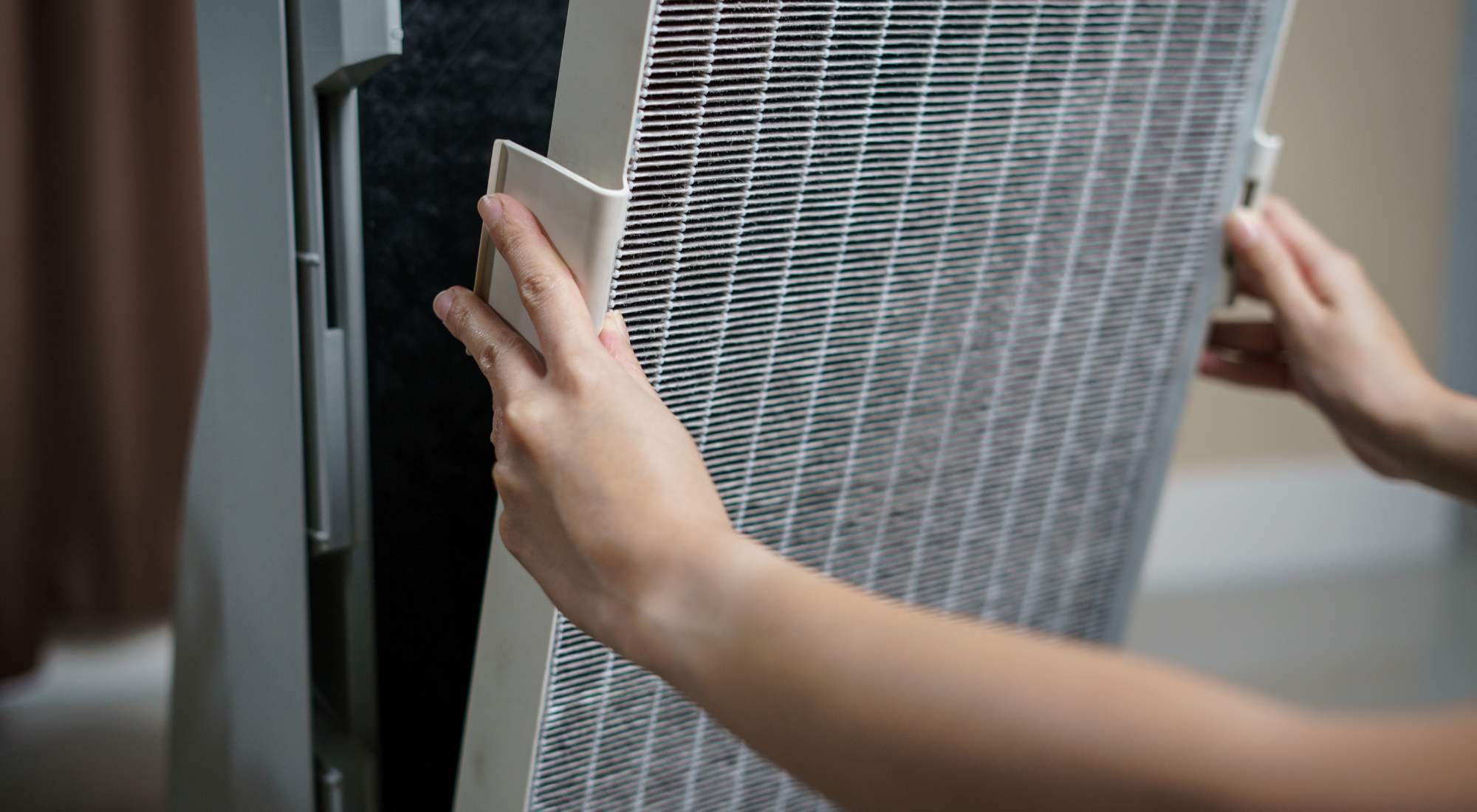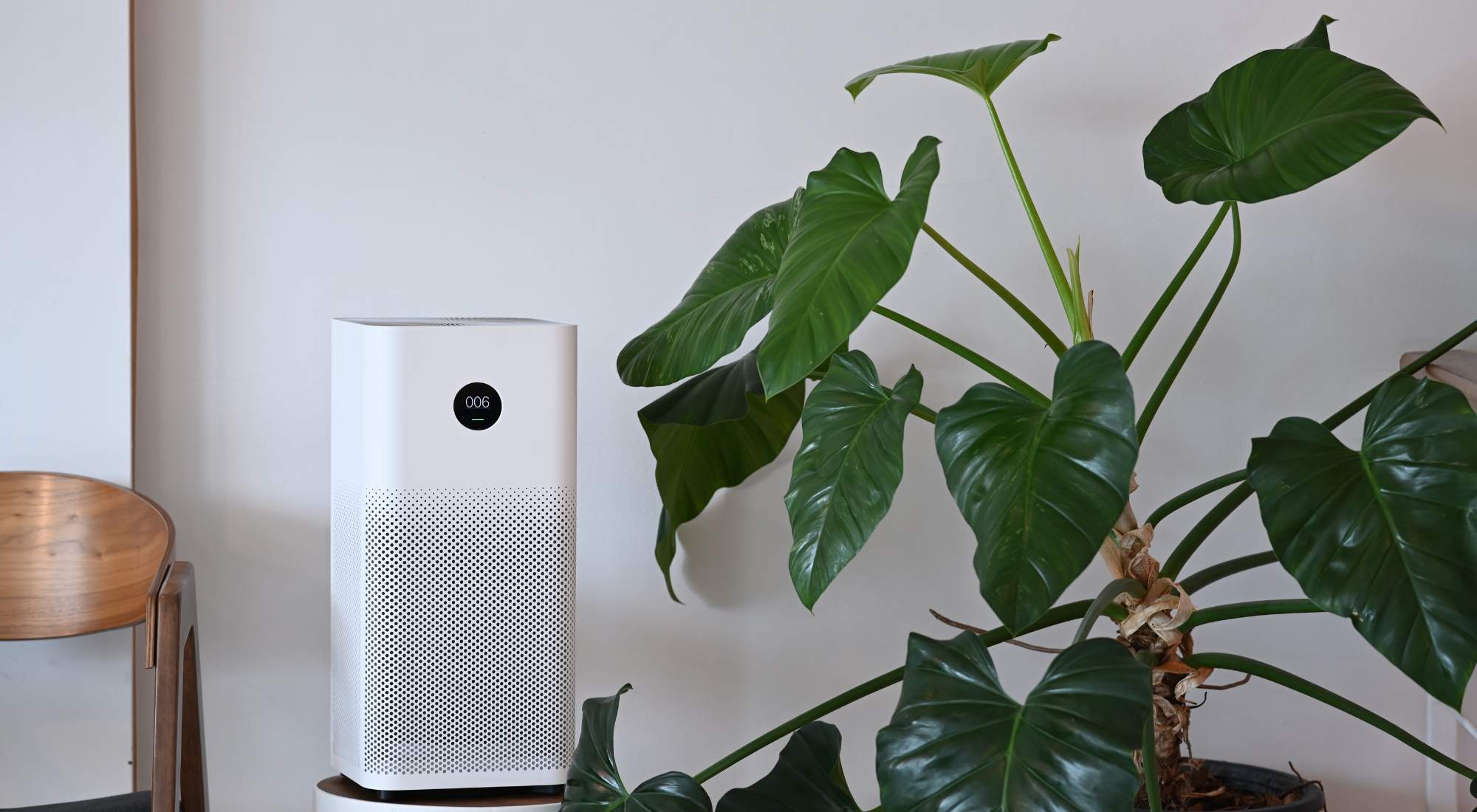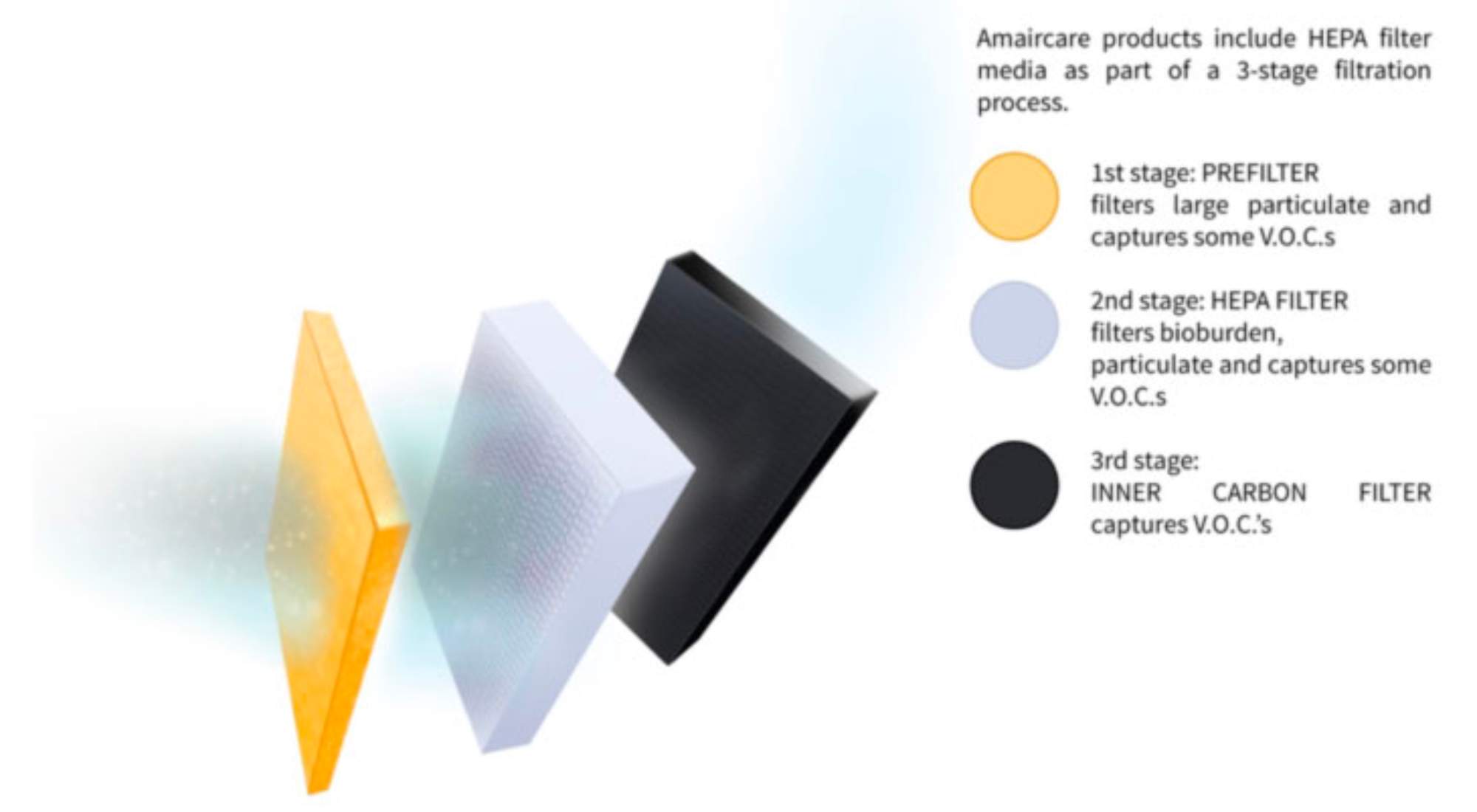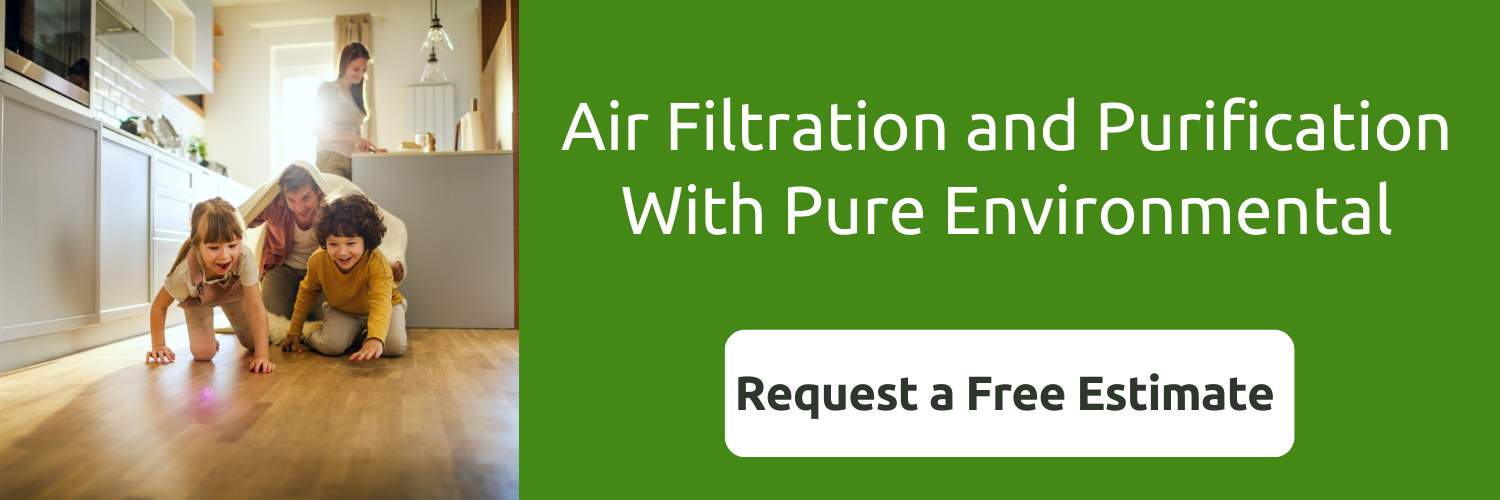Isn’t it just a little disturbing to think of all the impurities you may be inhaling every day? You’re enjoying the comforts of home when, now and again, the thought strikes you: The air in my home might be rife with invisible, harmful substances that could slowly break down my health and the health of my family.
That thought doesn’t have to bludgeon you at your weakest moments. There is a way to be confident that your home’s air is the cleanest it can be.
Allow the experts at Pure Environmental to thoroughly inform you about the functions and effects of air purifiers so you can decide how best to put your mind at ease about the air you breathe.
Table of Contents
- What Do Air Purifiers Do?
- Do Air Purifiers Work?
- Making the Decision To Invest in Your Home’s Air Quality: Are Air Purifiers Worth It?
- Are Air Purifiers Worth It When Used for Odor Elimination?
- Are Air Purifiers Worth It When Used To Make the Air in Your Home Healthier?
- Possible Health Benefits of Whole-Home Air Purification Systems
- What To Look for When Shopping for an Air Purification System
- Let the Professionals at Pure Environmental Help You Decide How To Make the Best Air Purification Investment
What Do Air Purifiers Do?
An air purifier has a fan that sucks air through one or more filters. These filters strain out particles and pollutants and send the clean air back into the space.
There are portable air purifiers, which only serve a single room, and whole-house systems that must be installed into the HVAC system and thus service the entire building.
There are many types of air purifiers on the market, differing in the following ways:
- Type and number of filters
- Square footage they are capable of purifying
- How much air is drawn through the filter
- Percentage efficiency rate (how well pollutants are captured)
- Amount of clean air they can circulate
- What pollutants are being targeted
- Strength of pollutant source
Though air purifiers share the general function of purifying the air, each does a different job depending on its capabilities. A home air test can help you determine what contaminants are in your living space, and thus which purifier might be best for you.

What Particles Can Be Filtered by Air Purifiers?
Air purifiers are designed to filter out airborne particles such as dust, pet dander, and pollen. A filter with more tightly woven fabrics (see the MERV rating) can trap smaller particles, such as bacteria and viruses.
An air purifier with a carbon filter can capture some volatile organic compounds (VOCs), which cause odors at least and are toxic at worst.
But we can’t expect air purifiers to purify the entire space, only the air. Air purifiers cannot eliminate mold growing on the walls and ceiling or dust and pollen that has settled to the ground and thus is no longer airborne.
Here is a list of the substances air purifiers can potentially reduce.
- The pre-filter removes large dust particles.
- The HEPA filter removes the following:
- Bacteria
- Viruses
- Aerosols
- Dust and dust mites
- Allergens
- Pollen
- Pet dander
- Mold spores
- Sub-micron particles
- The carbon filter removes the following:
- Chemical pollutants
- Volatile organic compounds
- Acetone–Found in nail polish remover, furniture polish, and wallpaper
- Acetic acid–Found most commonly in vinegar
- Butanal–Emitted by candles, barbecues, and gas stoves
- Carbon disulfide–Found in chlorinated tap water
- Ethanol–Found in glass cleaners and dish/laundry detergents
- Alcohol–Common disinfecting agent that evaporates quickly
- Formaldehyde–Found in molded plastics and lacquers
- Methylene chloride–Found in paint removers and aerosol solvents
- Smoke
- Road pollution
- Some odors
Do Air Purifiers Work?
How effective are air purifiers? That depends. You must invest in a good quality system to expect good results. To expect even better results, you’ll need to thoroughly purify your living space by investing in a system designed for the whole house.
The following factors will play a role in how effective an air purifier will be in your home:
- The types of contaminants
- How well-ventilated your home is
- The size of the space
- Type and number of filters in the air purifier
- Whether the source(s) of contamination can be eliminated
- Your house cleaning habits
- How often you use the purifier
Making the Decision To Invest in Your Home’s Air Quality: Are Air Purifiers Worth It?
The short answer: they can be. The long answer (which we’ll discuss in the sections below) is that it depends on your goal for the air purifier (odor elimination vs. healthier air) and what type of system you ultimately invest in.
Amy Schlinger, a fitness enthusiast from New York, wrote in 2016 that an air purification “literally changed [her] life.” She gave five reasons why air purifiers are worth it.
Once you realize that you can’t take for granted what you breathe in, Pure Environmental can step in to help. If you live in the Portland or Seattle areas, do not hesitate to contact Pure Environmental for your air purification needs.
Air purification is just one of Pure Environmental’s services. We research emerging technologies and use the best to serve you, whether to purify the air in your home or help you get rid of bed bugs or mold.
The Airwash HEPA filters and PurAyr treatments we use can remove 99.97% of the harmful and unpleasant substances in the air of your living space.
Are Air Purifiers Worth It When Used for Odor Elimination?
Neither portable units nor whole-home systems designed only to trap particulate matter will be particularly effective for odor elimination. According to the EPA, though they can trap some odor-causing substances, such as mold spores, they are ineffective in trapping gaseous pollutants, such as tobacco smoke.
A better way to get rid of odors is with a carbon filter, which binds organic odor-causing compounds in the air.
Are Air Purifiers Worth It When Used To Make the Air in Your Home Healthier?
This will depend on whether you’re considering portable or whole-home systems.

Portable Air Purifiers
Are they worth it? Portable air purifiers cover limited square footage. They won’t improve air quality in the entire home, but they can still be beneficial. They are more affordable and easily installed.
The California Air Resources Board suggests that portable air purifiers will purify the air in a given room faster than a whole-home system. This is because it can run constantly, not just while the HVAC system is actively operating.
Regardless, unless you buy more portable purifiers to cover multiple rooms, you will not experience the same degree of health improvements achieved by living in a home serviced by a whole-home purification system.
Whole-Home Air Purification Systems
The verdict is in; whole-home air purifiers are worth it, especially for people with allergies. It is also helpful for people who live in regions where wildfires are common. In areas of heavy smoke from wildfires, homes with air purifiers had better indoor air quality than those without.
Compared with portable systems, whole-home purification systems:
- Can reduce your electric bill by improving the efficiency of your HVAC system
- Purify more air and thus remove more toxins and allergens
- Require less maintenance (filters need changing only once every 1-2 years)
- Are quieter and less disruptive
- Take up less space
The main disadvantage of the whole-home system is that the initial installation can be expensive and complicated, possibly requiring you to hire an HVAC technician. Be sure to avoid purification systems that emit ozone, which is very harmful even in small amounts.
Possible Health Benefits of Whole-Home Air Purification Systems
Though it depends on what you hope to achieve, a whole-home air purification system will probably be the better investment. It will more thoroughly rid the air of the substances that trigger allergies and asthma.
Reduction in Allergic Symptoms
The data for the effectiveness of portable systems applies to whole-home systems as well, but to a greater degree, because of the more thorough function of the latter.
- The Asian Pacific Journal of Allergy and Immunology published a study demonstrating a significant reduction of the most common dust mite allergens and associated improvement in allergic symptoms.
- This study in the Journal of Asthma demonstrates that twelve weeks of active filtration significantly decreased children’s symptoms of allergic rhinitis.
- The Journal of Allergy and Clinical Immunology published a study that showed a 70% reduction of particulate matter in bedrooms where a portable system with a HEPA filter was installed.
Reduction in Asthma Triggers
For many asthmatics, reduction of the amount of airborne particulate matter in a home results in an increase in the number of days free of asthma symptoms.
This article from the Yonsei Medical Journal indicates a practical benefit of home air purification: less money spent on asthma medication during periods of air filtering.

What To Look for When Shopping for an Air Purification System
When investing in an air purification system, be sure that it has:
- High filtration efficiency (a MERV rating of at least 13 on a scale of 1 to 16)
- An air filter that traps and kills microbes (HEPA filters are ideal for this)
- A carbon filter that aids in the removal of harmful or smelly gasses, VOCs, and chemicals too small for a HEPA filter
- Low maintenance required
- Low noise
- Good Clean Air Delivery Rate (CADR)
There are three main ways that air purifiers target the substance they reduce in the air:
- By physically trapping them – Think: the HEPA filter.
- By generating ozone – This highly reactive molecule readily attaches to airborne organic compounds to oxidize and eliminate them.
- By using ionizing technologies:
- Electrostatic precipitators have charged plates that attract and trap particles.
- Air ionizers emit negatively charged ions that bind to compounds in the air.
While ozone generators and ionic purifiers might effectively remove harmful substances, they can emit unsafe amounts of ozone, which can lead to undesirable health consequences.
Let the Professionals at Pure Environmental Help You Decide How To Make the Best Air Purification Investment
Pure Environmental can assist you in getting your house outfitted with a whole-home or portable air purification system.
If you’re living in Portland or University Place, here’s how we can help:
- Call us to schedule your free consultation.
- Arrange a home visit with one of our installers.
- Discuss and decide on the best air purification option for your home.
- Begin breathing cleaner, fresher air.
Air purification is one of the best projects you can invest in to improve the health of your home and family. Pure Environmental considers all the factors discussed here and your particular needs to help you decide what system is best for you. Request a free estimate today.
Recent posts
- Pros and Cons of Heat Treatment for Bed Bugs: Things To Consider When Reviewing Your Options for Remediation
- How To Get Rid of Pet Odor in Your House
- Clearing the Air: How To Clean Walls From Cigarette Smoke
- Deodorizing Your Living Space: How To Get Rid of a Musty Smell in Your House
- How Do You Get Rid of Mold in Your Attic? Tips from the Professionals
Recent Posts
- Pros and Cons of Heat Treatment for Bed Bugs: Things To Consider When Reviewing Your Options for Remediation
- How To Get Rid of Pet Odor in Your House
- Clearing the Air: How To Clean Walls From Cigarette Smoke
- Deodorizing Your Living Space: How To Get Rid of a Musty Smell in Your House
- How Do You Get Rid of Mold in Your Attic? Tips from the Professionals
